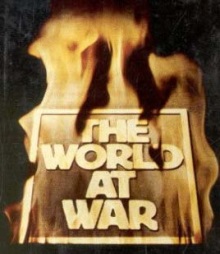
Like most gamers, I have always been fascinated by the Second World War, by far the largest armed conflict in human history. Unfortunately my education on the subject was somewhat scattershot, consisting of random readings here and there and lately enlivened by Wikipedia articles and, most of all, time spent on Paradox’s Hearts of Iron game. So when I heard about this series on Broken Forum and learned that it is one of the most highly acclaimed documentaries ever made, I suggested to my wife that we watch it.
Since this series consists of 26 episodes of about 50+ minutes, this is no small endeavour. And there was always the risk that watching a documentary made in 1973 might turn out to be boring. This turned out not to be true at all. Not only is every episode genuinely engaging, but we couldn’t get enough of it. The series does cover a remarkably broad swath of topics but does have serious omissions. I’ll talk more about that later.
The series as a whole was produced by Jeremy Isaacs and narrated by Laurence Olivier. Each episode covers a specific topic. For example the first episode is entitled “A New Germany” and discusses Adolf Hitler’s coming to power in Germany. But what really makes the series so immensely valuable are the extensive interviews. The interlocutors include not only an assortment of soldiers and civilians who fought and lived through the war but also a veritable who’s who of the people in power at the time or the staff closest to them.
These famous names include Albert Speer, Hitler’s personal architect who became his Minister of Armaments, Karl Dönitz, who championed Germany’s U-Boat program and later became Commander-in-Chief of the Kriegsmarine, Traudl Junge, one of Hitler’s private secretaries, Anthony Eden, Britain’s Foreign Minister during the war, Arthur Harris, Commander-in-Chief of the RAF Bomber Command and famous for bombing Germany’s cities, Koichi Kido, the closest advisor to emperor Hirohito throughout the war, Minoru Genda, one of the planners of the Pearl Harbour attack, William Harriman, the U.S. ambassador to the Soviet Union and Secretary of Commerce under Harry Truman and Paul Tibbets, the pilot of the plane that dropped the atomic bomb on Hiroshima.
The war is portrayed through extensive archival footage gathered from apparently all sides. The episodes cover all of the major campaigns with extra episodes devoted to topics such as the Holocaust, civilian life within the different countries while the war raged and ending with an episode exhorting viewers to remember the losses and deaths of all those who perished. All of them are well-written, cover a variety of points of view and are eminently interesting.
This being a British television series, there is a noticeable focus on Britain’s involvement. Overall, considerably more time is spent on the European war with Germany than on the Pacific war with Japan. Most of this is understandable, but it is still somewhat grating that for example, the Reckoning episode covers the Nuremberg Trials but fails to even mention the Tokyo War Crimes Trials.
But by far the biggest failing of the series is the almost complete lack of coverage of the Sino-Japanese War. It couldn’t have been out of ignorance. The series states that China was the first country to be attacked in the Second World War and that China’s total losses amounted to 14 million, second only to the 20 million of the Soviet Union. It is outright shameful for example that the Doolittle Raid is mentioned multiple times but no note is made of the fact that the exit plan consisted of emergency landings in China. There the Chinese helped to shelter and hide the air crews and Japanese reprisals against these efforts cost the lives of over a quarter of a million Chinese.
I get that in 1973 China was in the depths of the Cultural Revolution and wasn’t likely to cooperate with the makers of the documentary and footage of the war in China would be almost impossible to obtain. But there must have been plenty of Americans around who could have talked about what happened. Many of the surviving members of the Doolittle crew for example continued to serve in the China-Burma-India theatre. This makes for a huge gap in what is otherwise a very complete picture of the war.
Other than this admittedly rather large blemish, this is a fine documentary that should be obligatory watching for anyone who wants to know more about the war. I think it is now an irreplaceable historical resource since just about everyone interviewed is now dead, many of them within just a few years after this documentary was made. How much the war continues to shape important events today is obvious with Russia’s current behaviour vis-a-vis Ukraine being especially a clear illustration. And of course, as the series reminds us, the heroic sacrifices of those who saved the world from tyranny deserves to be remembered.